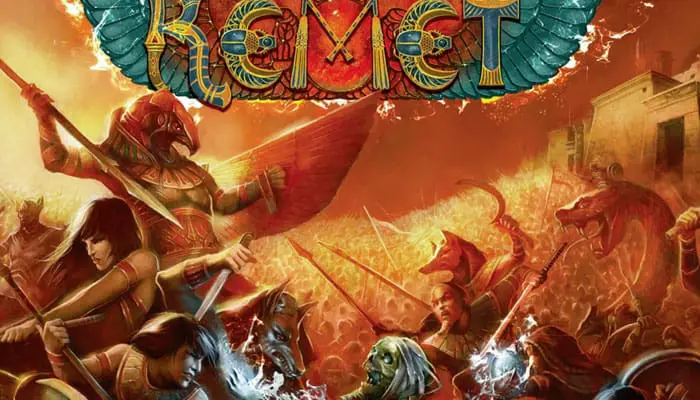
In the Mythic age of Ancient Egypt, the powerful gods throw their troops into epic battles to demonstrate their power. In the desert or at the feet of gigantic temples, they use their many powers to support their troops, summon and control mythological creatures and gain the upper hand.
Components

- 1 Board
- 48 Power Tiles (16 white, 16 red and 16 blue)
- 7 Creatures: Sphinx, Phoenix, Mummy-Priest, Giant Scorpion, Royal Scarab, Deep Desert Snake and Ancestral Elephant
- 35 Divine Intervention cards
- 32 Battle cards including 2 specials
- 53 Victory Points
- 3 silver and 1 golden Action tokens
For each player (5 colors):
- 12 Units
- 5 Action tokens
- 1 Prayer Point marker
- 1 individual Board
- 1 order marker
- 3 Pyramids (1 white, 1 red and 1 blue)
- 1 card index for Divine Interventions and Powers
- 6 Battle cards
Object of the Game
The goal of the game is to win 8 Victory Points (short Mode) or 10 Victory Points (long Mode). The mode (short or long) is chosen before starting the game.
Elements Of The Game
The Board
The board has two sides. One is used for a game with 3 or 5 players, whereas the other is for 2 or 4 players. Furthermore, for the 2 or 3 player games, the East bank isn't accessible for the whole game.

The board is divided between desert spaces and special spaces: player's cities, temples and the Sanctuary of All Gods. Furthermore, the harbors and obelisks, printed on some spaces, affect movements.

Players' Cities
Each player possesses a city composed of three districts. Each district is a space, and contains has a room for a pyramid. Each district is also surrounded by a wall.

Temples
Controlling a temple gives one temporary Victory Point and Prayer Points. Furthermore, controlling at least two temples in the end of a day phase, gives a permanent Victory Point.

Sanctuary Of All Gods
the Sanctuary of All Gods is not considered to be a temple. If the player controlling it sacrifices two units, he gains a permanent Victory Point.

Obelisks:
All of the temples, the Sanctuary of All Gods and some desert spaces contain an obelisk.

Harbors:
Harbors allow the crossing of the Nile; they don't form a separate space.
Pyramids
Each player has three pyramids: one white, one red and one blue. Pyramids allow players to buy Power tiles. The level of the pyramid is equal to the number visible on the top. Each pyramid must be placed in a different district in the players' city.
Troops
Each figurine represents a unit. All the players' units in one space form a troop.
Important!
One troop can't contain more than 5 units. That is to say, one player can never have more than 5 units on the same space.
Prayer Points
Prayer Points are the primary resource of the game, and allow players to perform different actions. The Prayer Points symbol is an ankh  . A player can NEVER possess more than 11
. A player can NEVER possess more than 11  , even with Power Tiles.
, even with Power Tiles.
Victory Points
Several objectives and events allow players to gain Victory Points:
- Square Victory Points are permanent and can't be lost.
- Round Victory Points are temporary and can be lost (usually as a result of an invasion).
- Victory Points are called VP, and their symbol is an eye.
How To Win Permanent Vp:
How To Win Temporary Vp:
Divine Intervention Cards
There are 35 of them. The rules refer to them as DI cards.
Power Tiles:
The Powers significantly change each player's abilities and can modify several rules of the game. There are three colors of Power, corresponding to the three pyramid colors. The Powers families are composed of Powers from level 1 to level 4. There are four cards per level, that is to say 16 Powers for each color. Power Tiles must always be visible.
Setup
- The board is placed in the center of the table
1. The side is chosen depending on the number of players. Reminder: For 2 and 3 players, the eastern bank isn't accessible. - All the Power tiles are placed face up next to the board.
2 - The Temples' temporary VP are placed on them.
3 - The Sanctuary of All Gods permanent VP are placed on it.
4 - The other VP are placed next to the board.
5

Each player chooses a city and receives:
- An individual board.
6 - 5 Action tokens.
7 - 1 marker, placed on the 5th space of the Prayer Points scale.
8 - 12 units (10 units to distribute in the city, in districts with a pyramid, with a limit of 5 units per space. 2 units stay in the reserve).
9 - 6 Battle cards.
10 - 3 Pyramids (Level 0 pyramids stay in the player's reserve).
11
Each player receives a random DI card. The other DI cards are placed next to the board face-down in a draw pile. 12
For the first turn, the players choose the turn order randomly. 13 Then, each player, in turn order, chooses how to allocate 3 points among his pyramids, choosing either of the following combinations: 1 / 1 / 1 or 2 / 1 / 0.
Game Turn
The game is a succession of Night and Day phases until at least one player wins the game.

A - Night (preparation Phase):
- Distribution of 2 Prayer Points
- Distribution of the Divine Intervention cards
- Night Powers effects
- Determining the turn order

B - Day (action Phase):
- Using the Action tokens
- Attribution of the Prayer Points and the permanent Victory Points of the board.
Beginner Mode
In the preparation phase, only the level 1 Power tiles are shown, the level 2 Power tiles will be implemented at the beginning of the second Day phase. The pyramids can only evolve to level 2 and not beyond this limit.
The winner is the first to reach 4 points instead of 8 at the end of a Day Phase.
A. Night Phase
1. Distribution Of The Prayer Points
Each player receives 2  (plus Prayer Points awarded by his Power tiles if applicable).
(plus Prayer Points awarded by his Power tiles if applicable).
2. Distribution Of The Di Cards

Each player receives a random DI card, distributed in turn order. There's no limit to the number of DI cards a player can have in his hand.
Playing a DI card doesn't count as an action. It is possible to play several DI cards in the same phase, even with the same effect (effects are cumulative).
A played DI card is discarded face down. When the DI draw pile is empty, shuffle the discard pile to create a new DI draw pile.
In order to play a DI card, players must:
- Pay the cost, if any (1
 ).
). - Play the DI card only at the appropriate time.
3. Resolving Power Effects
In turn order, each player applies the effects of his Power tiles containing the Night symbol.
Example: The Hand of God power allows the player to raise l of his pyramids by 1 level without any cost.
4. Determining The Turn Order
The turn Order will be determined as follows:
- The player with the fewest VP determines the order of the entire turn
- In case of a tie, the player who previously played earlier in turn order determines the order of the entire turn.
For the first turn, the turn order is randomly determined.
B. Day Phase (Action Phase)
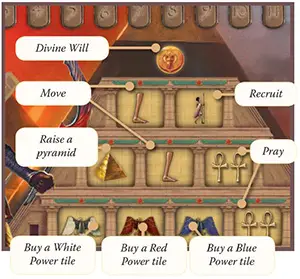
Each player has 5 Action tokens. In turn order, each player puts down 1 Action token on one of the action spaces of his individual board, and immediately applies its effect.
This procedure is repeated until all Action tokens are used, that is to say for 5 turns.
Important!
The Action space must be empty, it is impossible to put down two Action tokens on the same space.
At the end of 5 turns, each player must have placed at least one token in EACH of the first 3 levels of the action pyramid on his individual board.
Note: The golden space at the pyramid's top is only used for the Divine Will Power (golden chip)
Description of the available actions
1. Pray
Gain two  immediately.
immediately.
2. Raising A Pyramid
This action allows players to increase the level of one pyramid. A player can only raise one pyramid by taking this action. However, he can raise a unique pyramid by several levels in one action.
The  cost is equal to the level the pyramid is being raised to. If a player raises his pyramid by several levels, he must accumulate the costs.
cost is equal to the level the pyramid is being raised to. If a player raises his pyramid by several levels, he must accumulate the costs.
Pyramids Effects:
- They allow players to teleport to an obelisk for 2
 .
. - They allow players to buy Power tiles of the same color and level.
- A level 4 Pyramid gives 1 temporary VP.
A player controlling an opponent's pyramid with a troop gets all its benefits (even the temporary VP if it's a level 4 pyramid). As long as his pyramid is controlled by an opponent, a player looses all its benefits.
3. Buy A Power Tile
This action allows the purchase of one Power tile of the specified color. In order to buy another Power of the same color, the player must wait till the next turn. Powers allow a player to gain benefits in the game, and to focus his strategy by developing power combinations.
Reminder: A level 0 pyramid isn't placed on the board. When it becomes level 1 or more, it's immediately placed in a free district of the player's city.
Condition of Purchase: To purchase a Power tile, the player must have a pyramid of the same color and at a level equal to or greater than the desired Power.
Purchase Cost: The cost of purchasing a Power tile is equal to its level. A Power tile is pur- chased permanently by a player for the whole game and cannot be lost. It must be placed in front of the player, clearly visible.
For example, to buy Shields of Neith which is a blue level 3 Power tile, you must have a level 3 or 4 blue Pyramid. The purchase cost is 3  .
.
The Power effects are immediate. However, some Powers will take effect only at certain times during the game (Example: Battle Powers, Priests, or powers which resolve during the Night phase).
Important: A player cannot purchase and will never gain 2 identical Power tiles.
This includes all Powers with the same effects and illustrations, even if they are of different colors like Divine Action and Victory Point.
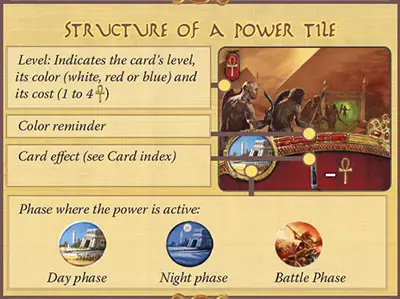
4. Recruit
Spend X  to immediately recruit X units. These units are taken from the reserve and are placed in one, two or three districts in the player's city.
to immediately recruit X units. These units are taken from the reserve and are placed in one, two or three districts in the player's city.
If a player is controlling an opponent's district:
- The controlling player can't recruit units there (Players can only recruit in their own city).
- The controlled player can recruit units as normal. This will immediately trigger a battle (it will be an attack).
Important: A troop can only contain a maximum of 5 units.
5. Move / Attack
The Move action allows 1 troop to move. It is not mandatory to move all the units of the troop; the player can leave some of them on his way. Furthermore, the player can gather units from spaces on his way, as long as he doesn't exceed the movement capacity.
By default, the movement capacity of 1 troop is 1 space.
This capacity can be increased:
- By Power tiles apply to all the player's troops.
- By the ability of a creature
- By a DI card for a chosen movement.
A troop can move in three different ways:
A) Ground Transportation:
The player moves one or several units of the same troop to an adjacent space.
B) Harbor Crossing:
It is possible to cross the Nile between two harbors connected by an arrow. It counts as a one space movement action, without any additional cost.
C) Using Teleportation By A Pyramid:
A player can teleport a troop from a pyramid (of his territory or an opponent's one) to an obelisk space. The player must pay 2  . Teleporting doesn't consume any movement capacity.
. Teleporting doesn't consume any movement capacity.
Within the limits of its movement capacity and resources, the troop can alternate Pyramid teleportation, ground transportation, and Harbor crossing in the same Movement, without any restriction.
Walls: Players' cities are surrounded by walls. It is only possible to enter another player's city if the troop begins its movement from a space adjacent to the city wall. (That is to say: it isn't possible to move to and enter an opponent's city in the same turn). The walls of a player's city have no effect on that player.
Attack: Whenever you move, if you pass through or reach a space occupied by an opponent's troop, a battle must be resolved and the movement ends.
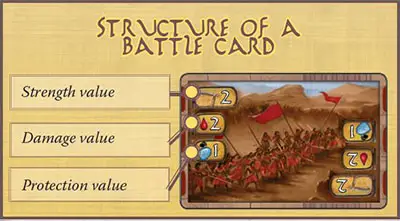
Battle Progress
At the beginning of a battle, the attacker and the defender should each choose 2 Battle cards:
- The first card is immediately discarded, face up or down.
- The second card is played in the battle.
Each player can also add to this card one or more DI cards. These are hidden under the battle card. Then, the players reveal their Battle cards. If there are DI cards, they are also revealed and players must pay any necessary.
After the battle, the played Battle cards are discarded (so are the played DI cards) face down or visible according to the choice made by the players before the beginning of the game. When a player has discarded all 6 Battle cards, he takes them all back into his hand.
Determining The Winner
The Battle value of each player is determined by adding together:
- The number of units in their troop
- The strength value of their Battle cards
- Any attack or defense bonuses from their Power tiles
- Any bonuses given by creatures engaged in the battle
The player with the higher Battle value wins the battle.
Clarification: In case of a tie, the defender wins the battle.
Counting The Casualties
Each Battle card has a Damage value and a Protection value. These values can be increased by DI, Power tiles, and creatures.
Both the winner and the loser of the battle lose as many units as the total Damage value of their opponent, minus their own total Protection value.
It is possible for the winner to lose all of his units. He is still the winner, even if the defender has survivors left.
Victory Points
If the attacker wins the battle, and has at least one unit left, he gains a permanent Battle VP. An attacker who loses a battle doesn't win any Battle VP. The defender doesn't win any VP, even if he wins the Battle.
Retreat
The defeated player must decide between recalling his troop (see below), or retreating. If he decides to retreat, the battle's winner has to choose the adjacent space, free of any units, to where the opponent's troop will be repelled. If there is no adjacent space with no units on it, then retreat isn't possible.
Recall a troop
After a battle, both the winner and the loser may choose to recall surviving units to their God. A player receives 1  for every unit recalled. These units are put back in the player's reserve. They will be available for recruitment later.
for every unit recalled. These units are put back in the player's reserve. They will be available for recruitment later.
It is not possible to split the troop by recalling some of the units, and leaving the others.
Creatures

There are seven creatures. They grant several avantages to the troops which travel with them. A creature is acquired by purchasing the corresponding Power tile.
The player can immediately put the creature down in one of his three city districts if he has at least one unit in this district.
Otherwise, the creature is placed in front of the player, on the corresponding Power tile.
Important!
A player can never have more than one creature on a given space, even if it is one of his city districts.
A creature doesn't count as a unit, therefore:
- It doesn't count towards the 5-unit limit.
- In battle, only its bonuses are added to the Battle value (it does not increase the number of units).
A creature can never be destroyed. If the last unit with a creature is destroyed, the creature his immediately put back in the city, on a district with at least one unit. If that is not possible, the creature is put back in the reserve, on its Power tile.
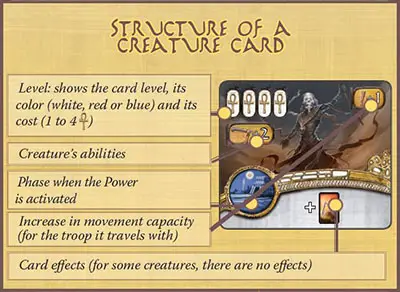
Creature In The Reserve
A creature in the reserve will return to the board, in one of a player's districts, when he uses the Recruit action. If several creatures are in the reserve, the player has to choose which one of them comes back first.
Controlling temples
A player who, at the end of a Battle or a movement, controls a temple gains a temporary VP for the corresponding temple. To control a temple, the player must have at least one unit on it. When there is no unit left on the temple, the player should give back the corresponding temporary VP.
Reminder: The Sanctuary of All Gods is not a temple.
Prayer and permanent victory points attribution
When all players have finished their actions, the distribution of the Prayer Points and the permanent Victory Points can start.
The player controlling the Delta temple may withdraw a unit from the temple and put it back in his reserve: he then receives 5.
Players controlling the other temples receives 2 or 3 . They also keep the corresponding temporary VP.
The player controlling the Sanctuary of All Gods may withdraw two units and put them back in his reserve: he then receives one permanent VP.
Any player who controls at least two temples (the Sanctuary of All Gods is not a temple) receives a permanent VP.
End of the Game
As soon as a player has at least 8 VP (or 10 according to the players' choice) at the end of a Day phase, he is declared the winner. In case of a tie, the winner is (in this order):
- The player with the most VP.
- The player with the most Battle VP.
- The player who played earlier in the previous Day phase
Continue Reading



